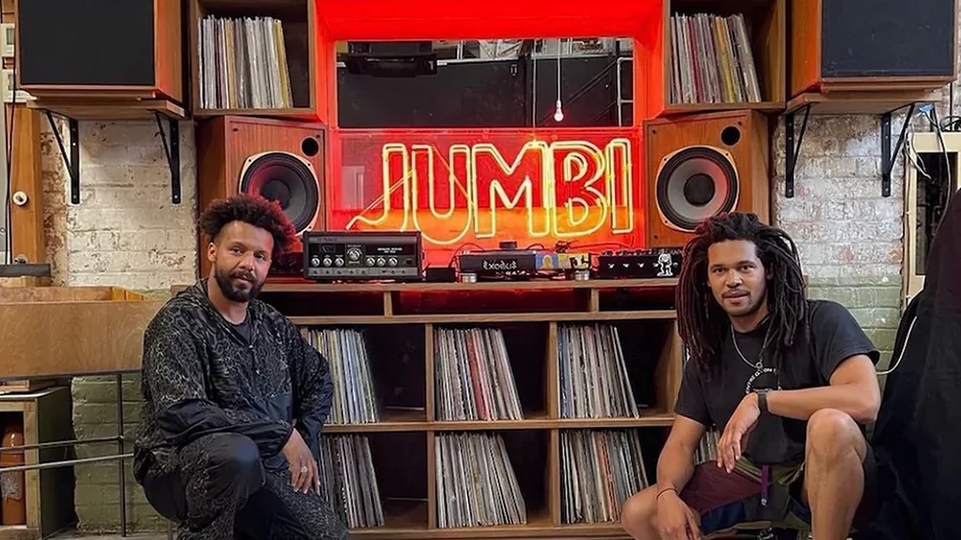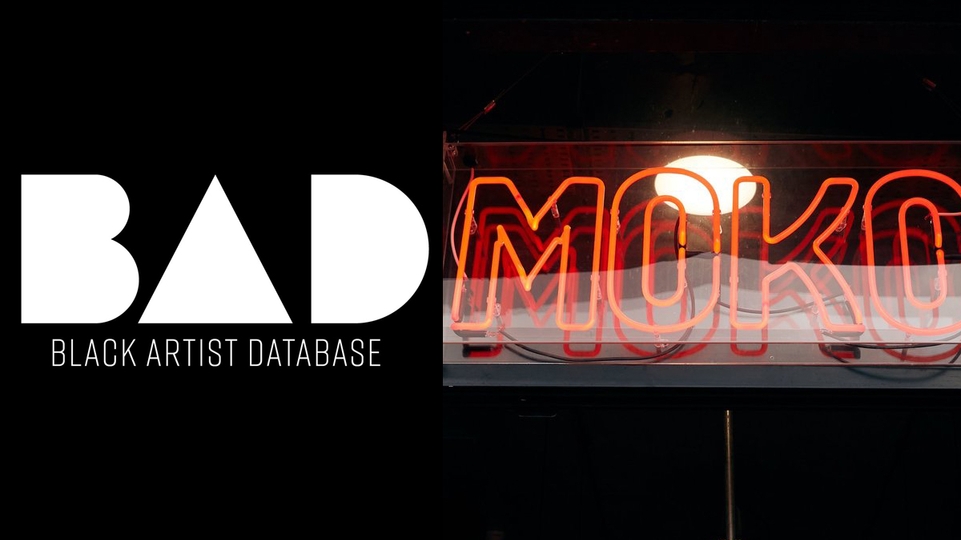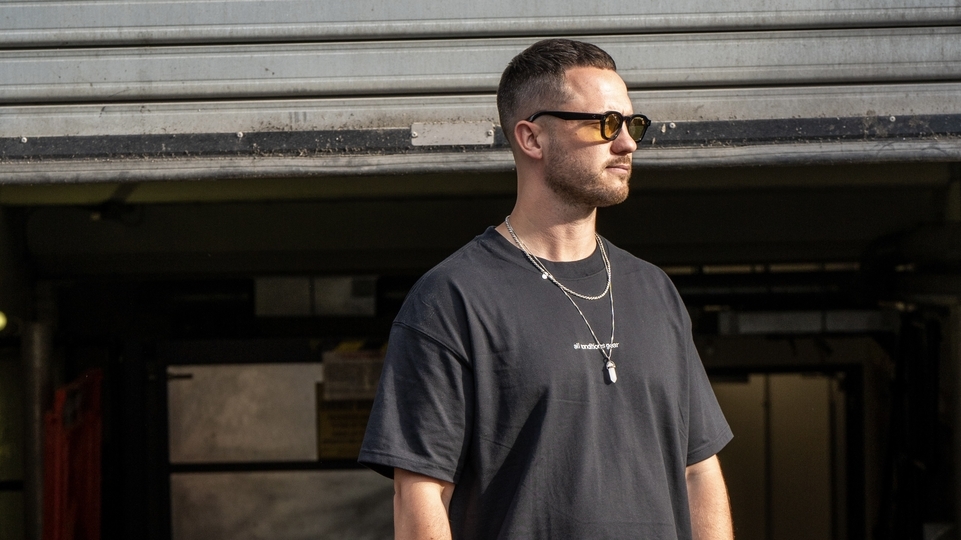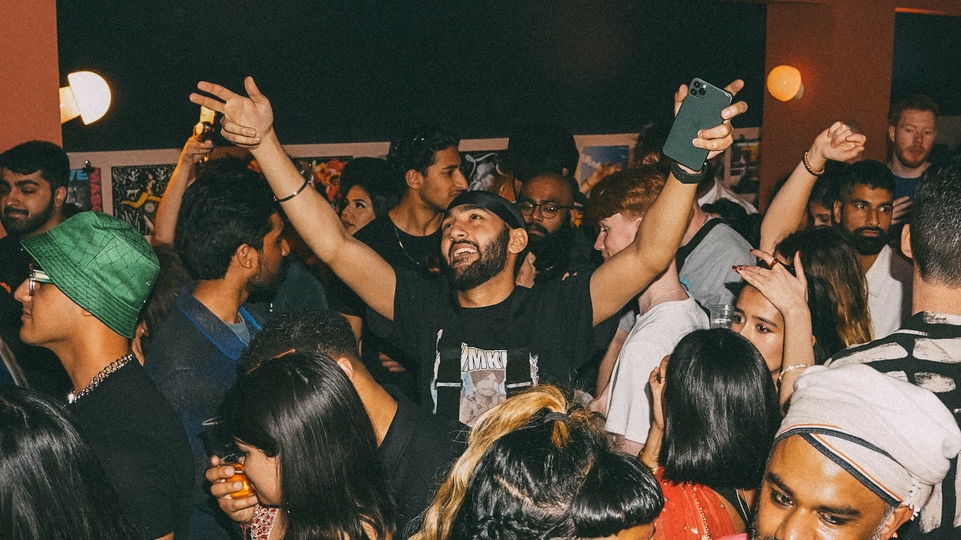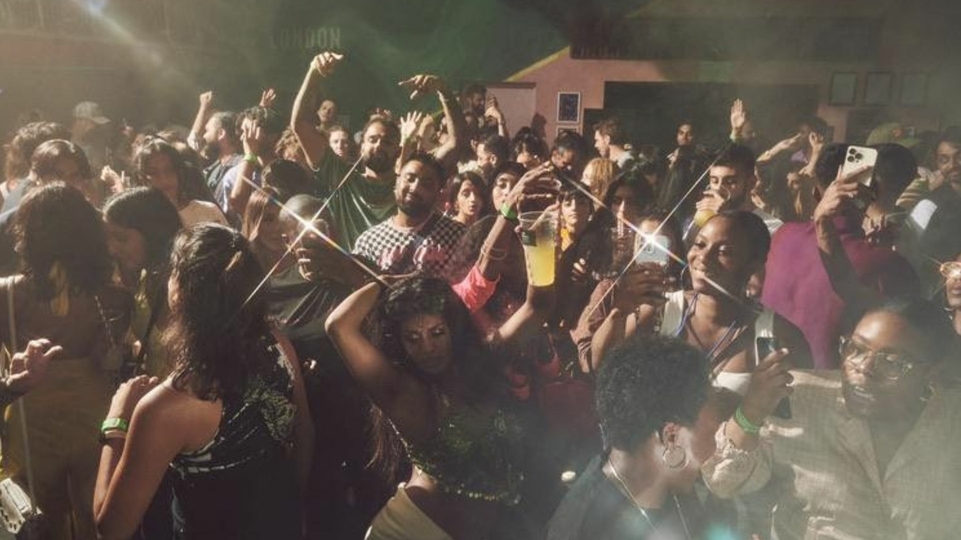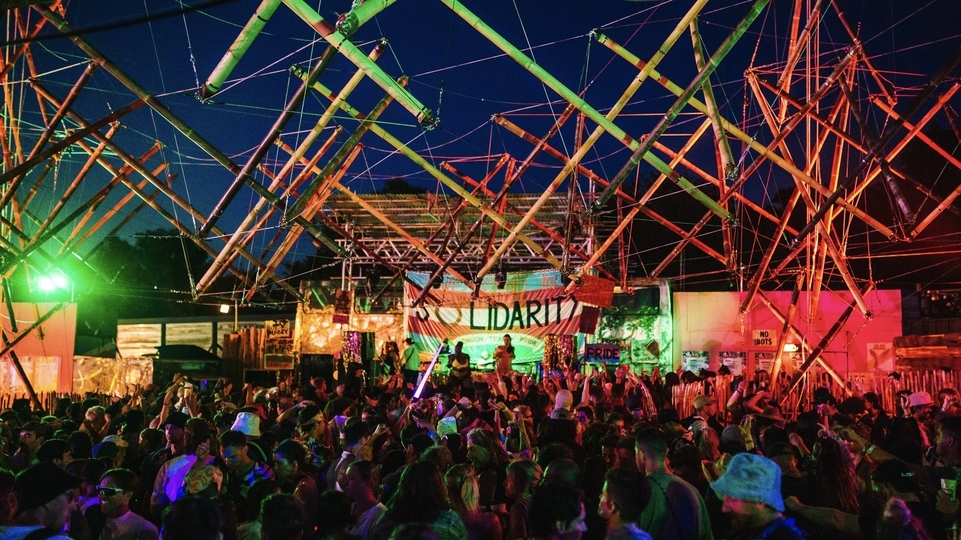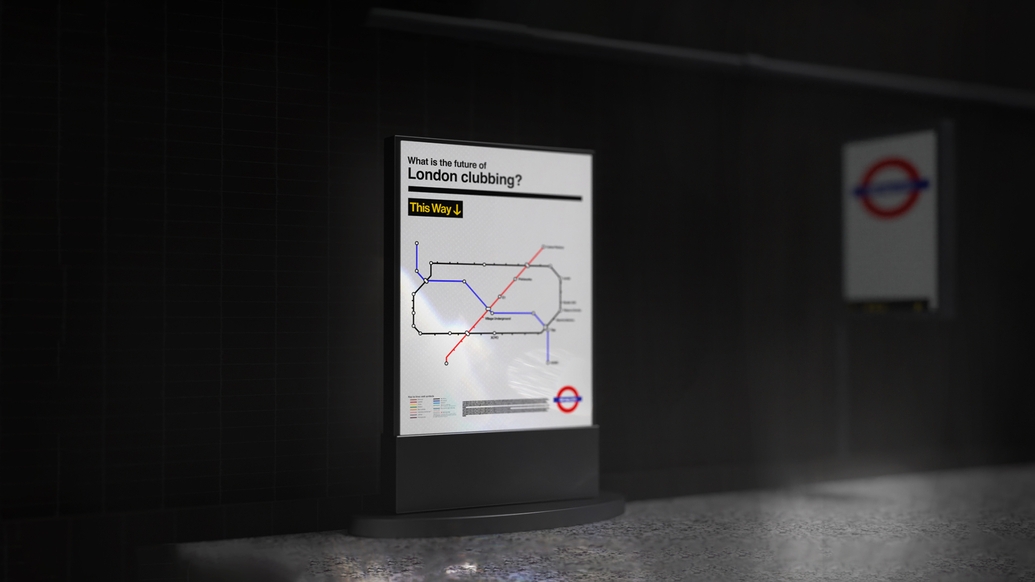
What is the future of London clubbing?
Over the past few years, against the backdrop of the cost of living crisis and austerity, an energised crop of community-focused collectives, promoters, and venues have emerged in the UK capital. Against some tough odds, they are fighting to keep the city’s electronic music scene not only alive, but thriving. Here, Georgia Mulraine looks at how promoters and partygoers are adapting to this new landscape, adjusting their expectations of what going out looks like and, ultimately, asks: what is the future of London clubbing?
It’s an early August afternoon in Tottenham, North London. Nestled on an unassuming industrial estate on Markfield Road, beautiful floor-to-ceiling record shelving is being assembled alongside a solid oak DJ booth for a new hi-fi listening bar, Moko. A sister venue to Jumbi, Peckham’s much-loved late night spot, the new venue is set to return dancers to the warehouse space that was previously home to the Five Miles nightclub — a former pillar of Tottenham’s blossoming clubbing scene.
“No one can’t be excited about what’s going on in Tottenham right now if you’re into nightlife,” enthuses Nathanael Williams, director of Moko, Jumbi, and Hackney Wick’s The Colour Factory, over Zoom as the build goes on around him. Just a few weeks later, the party at Moko is in full swing as the shelving — erected by Jay Heston Richards, also the designer behind Jumbi, found through a social media call out for Black carpenters in South East London — is stacked high with records. They are played through a custom made vintage sound system designed by London-based bespoke audio studio, Friendly Pressure.
The venue joins a growing list of new spaces that are opening an exciting chapter of London nightlife. However, these new venues are emerging amidst a backdrop of challenges presented by the ongoing cost of living crisis and austerity, as promoters and partygoers adjust their expectations of what going out looks like. It’s a crisis that has had a devastating impact on London’s venue numbers, with the Night Time Industries Association (NTIA) most recently revealing a 31% loss of nightclubs between June 2020 and June 2023 — over 100 independent clubs have closed in the past year. Yet, despite these pressures on physical club spaces, an energised crop of collectives, promoters, venue owners and innovators are fighting to keep the city’s electronic music scene not only alive, but thriving.
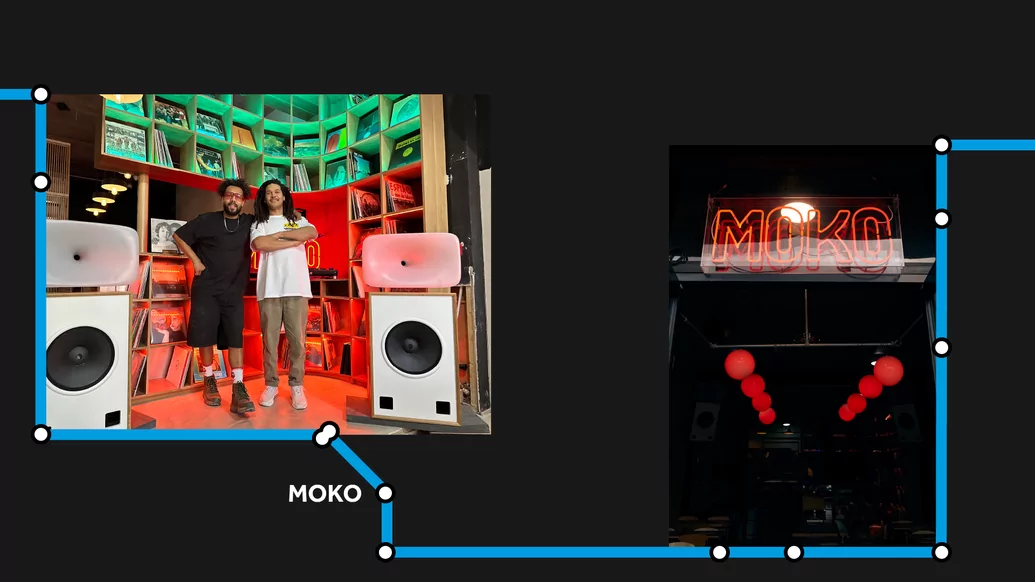
“Nightclubbing in decline is an age old tale,” explains London-based DJ, producer, and promoter, Saoirse. “I’ve been in London 13 years now and since then it’s been clubs close, close, close. Raves will always happen and people will make do with whatever they can, especially in the DIY scene. There’s always going to be issues you run into, especially [in] a city like London that’s based on capitalism. But actually, with recession, [and] having a Tory government, that’s when things get more DIY, and more interesting, and more art is created. It tends to be the way that people need to be, when they’re sort of forced out.”
Alongside Moko and Jumbi, Williams also runs The Colour Factory, where he hosts parties from collectives like Eastern Margins — described on the club’s website as a “home for alternative Asian culture” — PXSSY PALACE — an arts platform that “centre Black, Indigenous and People of Colour who are Queer, Intersex, Trans or Non-binary” — and Howl — who “bring together different LGBTQ+ communities under one roof”. “Being an underrepresented, community-owned club, it’s enabled us to empower community led collectives.” Williams explains. “And it just trickles down. This is the future of London. This is what the future of what promoting is going to look like.”
An extension of Jumbi’s community spirit, Moko also celebrates Caribbean culture. Where Jumbi is a mischievous spirit in Caribbean folklore, Moko is a healer. Together, it's a nod and reminder of Moko Jumbies, the tall, colourful stilts walkers who represent the history of Caribbean history are prominent festivals and celebrations including Trinidad and Tobago Carnival.
As a co-founder of Body Movements, Saoirse is another promoter familiar with running a party with an inclusive ethos in London. The festival’s summer edition takes place across multiple spaces in Hackney Wick, and “celebrates queer bodies in club culture”. Despite facing challenges with the unpredictability of venues staying open and rising financial costs, she maintains that it is the DIY spirit and communistic values behind the party that keep things going. “Body Movements needs to be something giving,” she explains. “We want to throw a big party but we also want to give something back. We really want Body Movements to become a kind of summit for queer culture and have a number of different arms to it — rather than just a big rave.”
Speaking to DJ Mag after last year’s summer festival, Saoirse explains what the team has learnt about making Body Movements work in the most safe and inclusive way. “After year one we realised that a lot of our venues weren’t used to having our types of events and community in their spaces. So we created a venue pledge: this policy which very much outlined what our ethos and values are. In order to work with us venues had to adhere [to] and sign this pledge, so if anything takes place in that venue has to do with their security or their staff, something that is ableist for example, we’ve already had a briefing, and done the work we can to and ensure they are on board. We also put on training for the staff to help them learn that working with the queer community can be different from the ‘standard’ hetronormative night — they can be vulnerable. I have to give Clayton (Body Movements’ co-founder) credit for putting a huge amount of work into that.”
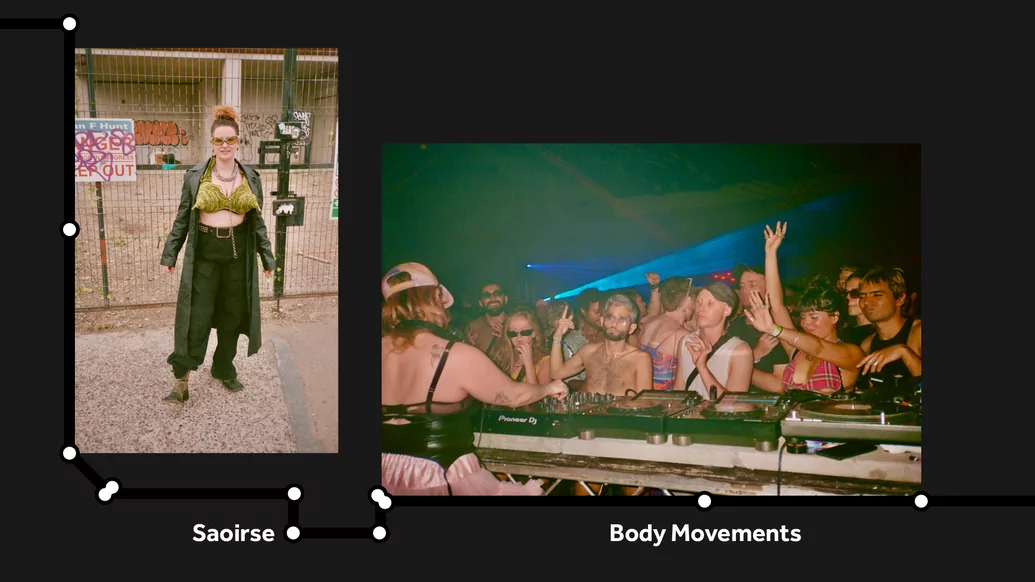
“The most important thing with taking on larger venues is still making it accessible and keeping local talent involved” – Saoirse, DJ, producer and co-founder of Body Movements
As well as the annual festival, Body Movements has been evolving what it can offer to its community with the first ever bodyWORKS + bodyTALKS event — a programme for “queer learning and cultural exchange offering DJ classes, talks and workshops”. The festival also hosted its first Body Movements Winter Edition at Printworks back in February 2023, before returning earlier this month (February 2024) in a multi-venue format in Hackney Wick. The demand for the party has built over time, largely as a response to Body Movement’s care and commitment to serving the queer community.
“For the Printworks winter edition, on the scale of community, we did exactly what we would do in Hackney Wick.” she adds. “We booked all of the residents, had cheaper tickets available, and initially had a pre-sale only available to people who had purchased tickets to the events before. This pretty much sold out. To cultivate a global music scene you do need to get bodies in the door and people in front of them at a large scale, to help artists’ music to filter through. But the most important thing with taking on larger venues is still making it accessible and keeping local talent involved. You shouldn’t be booking a line-up in an event like that of all international people and not [book] local talent as well.”
Long-standing London promoter Percolate manages the production at Body Movements. Starting out as a community event for friends and family, the collective has grown substantially since starting in 2012, with parties, projects and collaborations at a wide variety of London venues, as well at Waterworks festival at Gunnersbury Park and Queens Yard Summer Party in Hackney Wick. “These events have not relied on headliners but are more driven by community values,” explains Percolate co-founder, Simon Denby. “They are a lot more intimate and a lot less reliant on one talent. This is where we have found the most growth and excitement, and the best vibes to be honest.”
Percolate have been active in engaging with those from the clubbing community who are struggling with the rising cost of living, which is something that Denby sees as hugely important for the future of London clubbing. “We know that there are a lot of people really struggling,” he explains. “There are people out of work, [or in] low paid jobs, struggling to survive and therefore clubbing and festivals [are] a real luxury. If we can’t support these people with coming to these events, we will miss out on them getting into the scene, and they will find other things to do with their spare time.”
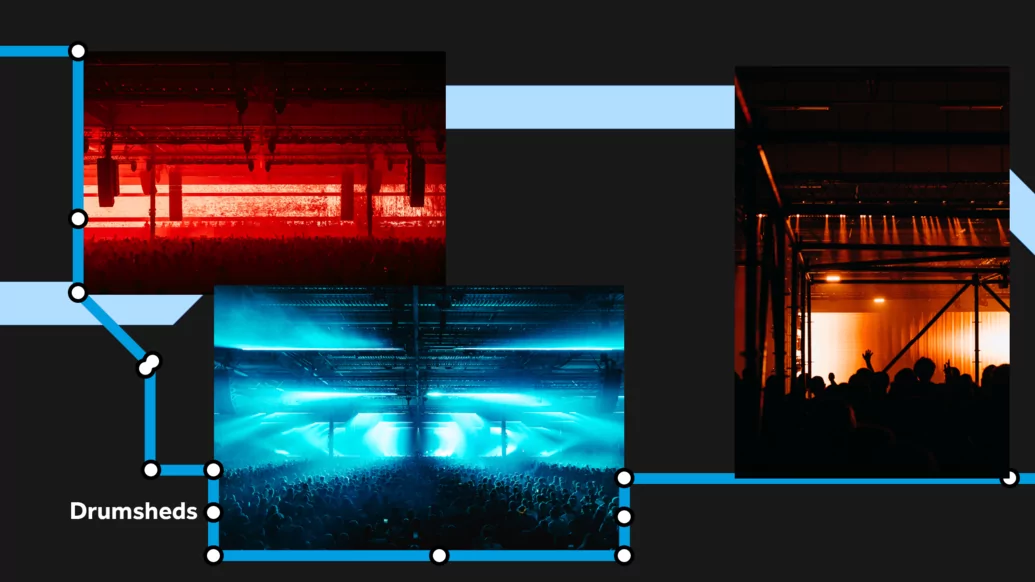
Percolate looks to tackle this problem through their community ticket links initiative, where low-waged or unemployed clubgoers are able to get in contact with Percolate in order to receive a discount. “We had an email from someone saying they had come to Waterworks last year and really loved it, but they were in a difficult position and only able to get a ticket they could afford,” Denby continues. “They saw the post this year so emailed saying their situation had changed and they wanted to buy a ticket for someone else who couldn’t afford and contribute something, which was amazing.”
In December, Percolate began an exciting new project alongside Little Gay Brother at Broadwick Live’s massive Drumsheds. False Idols is a new party that centres on “the ethos and ethics of queer clubbing and showcases exciting music from the queer underground and the wider underground”. Just north of Moko in Tottenham, Drumsheds — a 15,000 capacity venue in a former Ikea — opened in October last year. Although the closure of Broadwick’s Printworks for the foreseeable future in April 2023 ended one era of London clubbing, its new mega-venue now hopes to carry the torch for big room parties in the capital. It's no grassroots operation, but it seems that even the city’s biggest venues and promoters are looking to the DIY scene for inspiration, and that's indicative of its importance.
“It’s a really exciting opportunity to see some new artists on this big scale, with this caveat that this is open to people with the right intentions,” Denby adds. Despite the size of Drumsheds, he says the team are keen to make sure this event stays rooted in providing queer dancers a safe and authentic space.
“Traditionally, clubs had one location and one format, but now club brands can transcend a physical location — being more about bringing together their community,” Broadwick Live explains in a statement issued to DJ Mag. “Seeing our fans supporting, rallied and together in that final season [at Printworks] was something extremely special to witness, and we look forward to giving that community a new home in Drumsheds, and eventually back at Printworks in 2026.”
A club that originally built its entire modus operandi on eschewing a physical location is The Cause. The collective began its journey as an inspiring example of the resilience of London’s club community with an innovative model that saw them pioneer working with local council, police and developers in Tottenham to occupy a temporary space at their original Ashley Road site in 2018. Developments in the area continued throughout the venue's existence, and by the time the bulldozers eventually came in at the beginning of 2022, the club had raised more than £150,000 for charity through fundraisers, free parties and various projects. It had also established itself as a predominant force in London for grassroots electronic music culture.
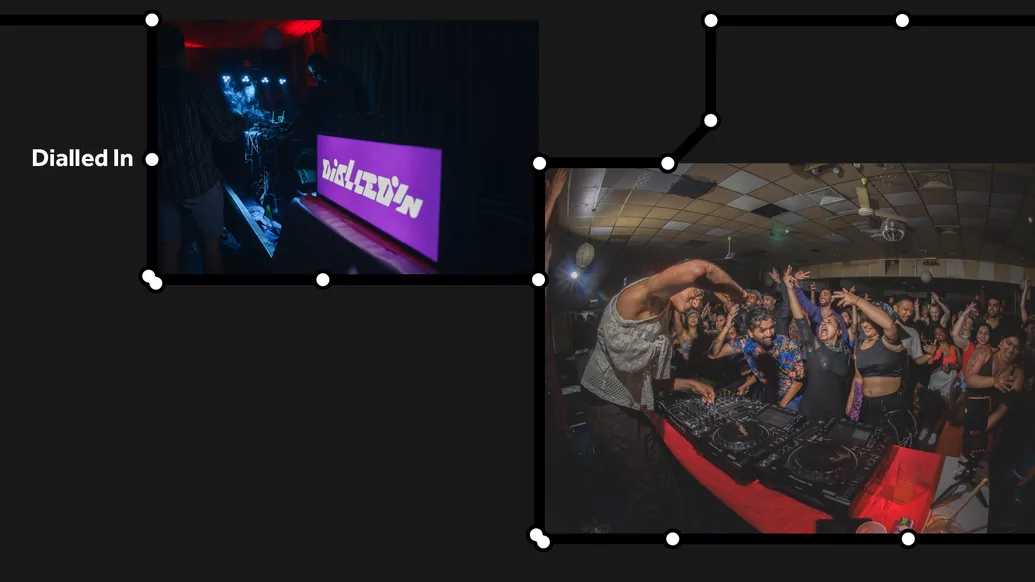
Last year, The Cause returned with a new venue at their East London warehouse space at 60 Dock Road in Docklands’ Silvertown, featuring a multi-floor labyrinth of rooms alongside an outdoor courtyard. Soft launching 18 months ago, the club has recently announced a full run of programming now it’s fully built and operational. “It’s really nice to see people come in and use the space how they want to use it. Everyone just feels comfortable,” co-founder Stuart Glen says. “We are just having a go, opening the doors to everyone and anyone around us and our friends. Our doors are open for anyone to do anything with us, or do something for their community.”
One of their longest running party collaborations, Adonis, is a beloved night for queer partying in the capital, largely sustained by resident DJs. Working with groups and artists whose values really align with The Cause’s community ethos has been an important part of how the team have run things. Collectives such as Hypoxia and Riposte, who strive for both affordable raving and creating judgement-free queer rave spaces, are just two examples of crews that perfectly align with The Cause.
Artist led South Asian collective Dialled In take on a similar approach to nurturing community. Almass Badat, DJ, content creator and Dialled In marketing lead explains that they look to tackle the real lack of South Asian people working in production, event management, curation or programming roles. One of their ways to solve the problem is by bringing in South Asian people who might have little or no experience and training them on the job.
At Dialled In: The Park they continued this journey by working with Waltham Forest Council to use locals in the build of the festival site. This included Aman and Ibrahim, two apprentices of South Asian origin who worked on The Island Stage build, alongside sustainable furniture enterprise ThinkFound, gaining them real woodwork skills and credentials for their portfolios. They also prioritised a call out for South Asian vendors at the event. “What happens is, you get this sort of moment of co-created community, understanding that we actually look after ourselves,” Badat explains. “We all help from the build to packing up. It's maybe the longer route. But it’s the right one. Because we are a community at heart.”
A number of collectives and artists are also working to ensure that nightlife remains accessible by throwing free parties in the city. One of the highest profile is Joy O’s semi regular Just For You series, which takes place at fabric London with unannounced line-ups, while The Cause has returned to throwing free parties at their new 60 Dock Road venue. Emerging monthly dubstep party NLDC also launched last year and has been running free 50-120 capacity events that have attracted artists including Riz La Teef, Zha, Chinese Daughter, Chuckman, Hindzy D and Leftlow to spin more intimate parties than you might usually expect to see them at.
“I’ve seen that when you put on something for free people are up for playing for free when they feel it's something really legit,” explains NLDC founder Josh Harris, also known as DJ Cueist. “As much as it’s for music, it’s also a bit of a meeting spot. You’d hear about events back in the day where people would just kind of pop down and share tunes. Old FWD>> [parties] were just a group of mates. You can't do that so much in massive rooms with massive sound systems. You can’t have a conversation.”
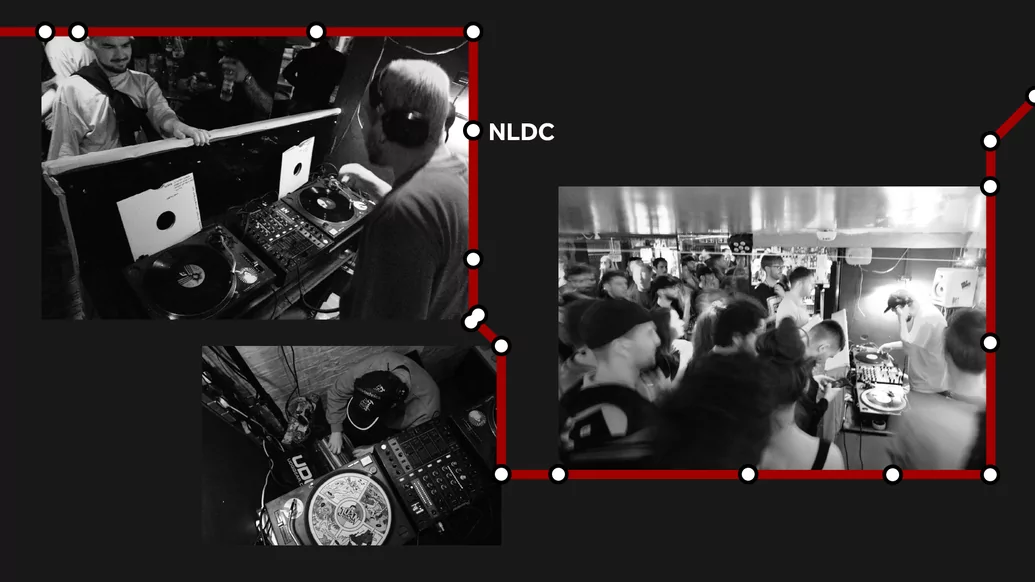
“Garnering that kind of community where you have people come in week in week out has been essential for us to continue, especially as it took time for Dock Road to grow.” – Stuart Glen, co-founder of The Cause
Sourcing venues has been what Harris describes as a fun challenge so far, with the night having taken place in East London’s former strip bar turned LGBTQ+ venue, The Queen Adelaide, and, following that, Dalston’s Copper Cats, before hosting his first event at Dalston Den this week (15th February). “NLDC stands for North London Dub Club.” he continues. “The club part is kind of the point. It’s part of the reason with it being so regular. I want people to know it's on for them every month. Even if there’s some disaster with the venue, or people have to pull out. We’ll put something on even if it’s in someone’s house. The closer I can get to putting a house party on in a basement venue, the better. They are the best parties.”
The common thread when speaking to all of these clubs, artists and promoters is the need for community during challenging times. As well as their new space at 60 Dock Road, The Cause have also laid down foundations in East London’s Hackney Wick with their second musical outpost, All My Friends. Decked out with a bespoke Concept Object sound system and record shop, the venue serves as both an intimate, community-focused hangout and dancefloor.
“All My Friends has been amazing,” Stuart Glen shares. “We have people coming in and out to buy records or to have a drink or to talk about music or whatever. Garnering that kind of community where you have people come in week in week out has been essential for us to continue, especially as it took time for Dock Road to grow. We’ve needed this offshoot where we’re really connected to local people.”
Just round the corner, long-standing bastion of Hackney Wick, Number 90 — formerly known as Studio 9294 and home of London’s much-loved minimal party, Half Baked — has also recently expanded, while FOLD has stood strong over its five years of existence. As London’s first 24-hour nightclub, FOLD maintains an inclusive space, providing safe and exciting programming for London’s LGBTQ+ and minority communities, while their continued UNFOLD party series also continues London’s long-standing Sunday daytime format.
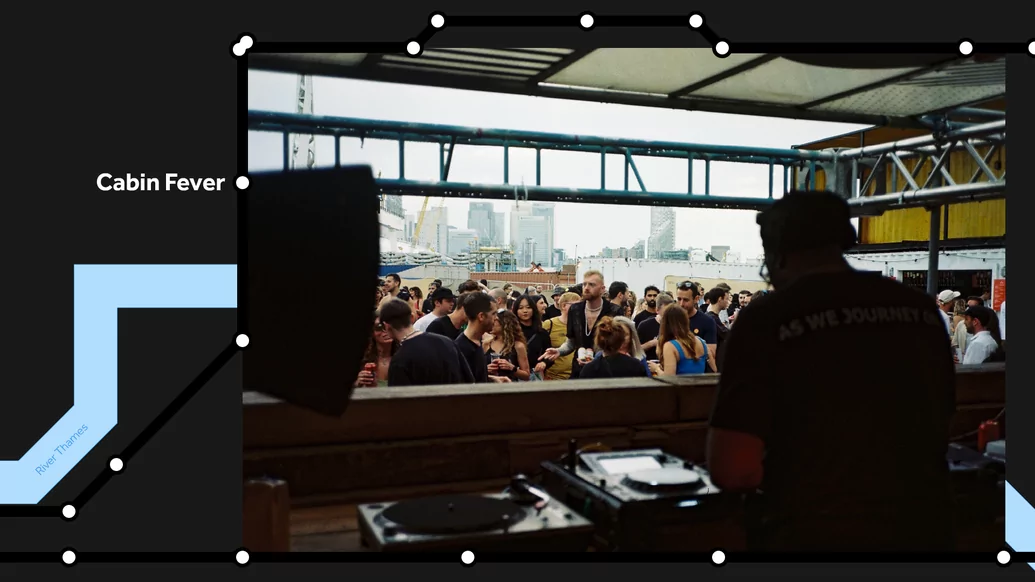
fabric, a long-standing bastion of London clubbing, expanded its stable of residents last year, giving a regular platform to local heroes pushing electronic music culture in the city. Elsewhere, intimate parties with programming that exists on the bleeding edge of electronic music are thriving in smaller venues in South East London, such as Venue MOT — an abandoned car garage turned club — Carpet Shop and Ormside Projects. The latter has established itself as a leader for inclusivity, striving to make the venue and its events more accessible for the neurodivergent community, as outlined in a recent DJ Mag feature by Rihana Osman.
London’s Cabin Fever joined The Cause in its summer 2023 programming, working alongside Welsh festival Freerotation to run a 16-hour day-to-night party with artists including Surgeon, Anastasia Kristensen, Willow, Shackleton and Barker. “We’ve always been attracted to The Cause for their DIY ethos, and their free party spirit,” explains co-founder Will Bradbury. “They have this charitable aspect to them, which is quite aligned with Freerotation and their ethos. [The festival] celebrates diversity and variation in club sounds and genres. So, it gave us the opportunity to do that in a cohesive way.”
Bradbury, who also runs the Control Freak Recordings label, says that Cabin Fever are still evolving and, like many of the collectives at the forefront of London’s club scene right now, their focus is on the people who are returning to their parties, and the power in understanding their community. “The longer you run stuff, the more you're like: why is everyone here? What are they doing? What is actually bringing these people? I haven’t totally figured that out yet.” he says. “But one thing that has been very clear to me, particularly post-pandemic, is just how important live music is in unifying people. In an increasingly individualistic and fragmented society, clubs are still one of the few places people come together and mix and interact. And, hopefully, that’s not something that’s going to stop happening.”

